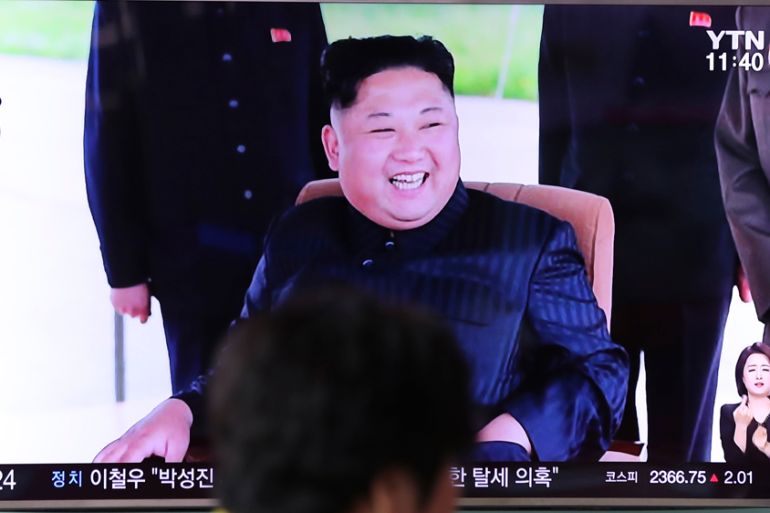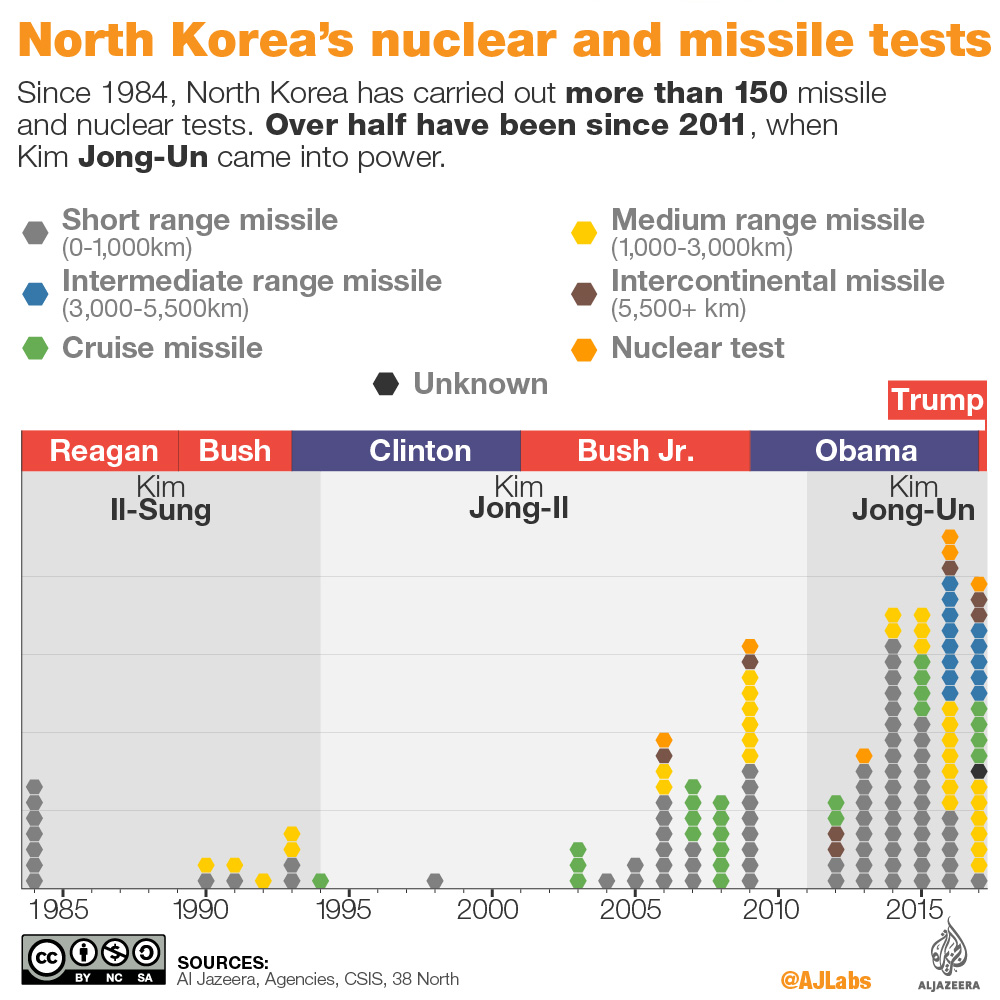North Korea conducts most powerful nuclear test yet
Pyongyang lauds ‘perfect success’ of its sixth nuclear test with a hydrogen bomb as tensions with US and allies soar.

North Korea has carried out its sixth nuclear test – the most powerful blast to date – drawing the ire of the international community as the standoff with the United States continues to intensify.
The official Korean Central News Agency (KCNA) said the hydrogen bomb test on Sunday morning, ordered by leader Kim Jong-un, was a “perfect success”.
Keep reading
list of 4 itemsIsraeli minister suggests reported attack on Iran was ’feeble’
Israeli attack on nuclear sites to prompt tit-for-tat, pursuing nukes: Iran
Bombs and viruses: The shadowy history of Israel’s attacks on Iranian soil
It was Pyongyang’s first nuclear test since US President Donald Trump took office, and marked a direct challenge to Trump, who hours earlier talked by phone with Japanese Prime Minister Shinzo Abe about the “escalating” nuclear crisis in the region.
Later on Sunday reporters asked Trump whether he would attack North Korea in response. “We’ll see,” replied the US president.
The nuclear test at 03:30 GMT was carried out to “examine and confirm the accuracy and credibility” of North Korea’s technology, KCNA said.
The news agency hailed the bomb’s “unprecedentedly large power”, saying it “marked a very significant occasion in attaining the final goal of completing the state nuclear force”.
Pyongyang earlier on Sunday reported details of its latest weapon, claiming it has developed a more advanced nuclear bomb that can be loaded onto an intercontinental ballistic missile (ICBM).
KCNA released undated photographs of Kim inspecting the weapon.
TIMELINE: North Korea’s nuclear tests
The hydrogen bomb’s power is adjustable to hundreds of kilotons and can be detonated at high altitudes, with its indigenously produced components allowing the country to build as many nuclear weapons as it wants, KCNA said.
Pyongyang started nuclear blast experiments in 2006.
In July, Pyongyang test-launched two ICBMs that are believed to be capable of reaching the mainland United States.
The latest test took place in breach of UN sanctions and further increased tensions between Pyongyang and the United States and its allies.
There was no independent confirmation that the detonation was a hydrogen bomb.
![South Korean President Moon Jae-in arrives for the meeting of the National Security Council at the presidential Blue House [South Korean Presidential Blue House via Getty Images]](/wp-content/uploads/2017/09/4e18d622ac2c48ad926417549220fc19_18.jpeg)
International condemnation followed swiftly.
South Korean President Moon Jae-in called for the “strongest” response and further steps to isolate North Korea, including new UN Security Council sanctions, according to Yonhap state news agency.
South Korea is not a member of the UN Security Council.
Al Jazeera’s Wayne Hay, reporting from Seoul, said as well as tougher UN Security Council resolutions, South Korea also backs individual countries imposing their own sanctions.
“Those sorts of calls are likely to face strong resistance from countries such as Russia and China,” Hay said.
“Since the test was confirmed, the defence ministry has called for a strong military response. That does not necessarily mean it is calling for a direct attack on North Korea by South Korea and the United States, but it wants a show of force … to show North Korea it has the ability to strike its missile and nuclear facilities if it chooses to do so in the future.”
China, North Korea’s main ally and economic supporter, strongly condemned the test.
Pyongyang “has ignored the international community’s widespread opposition, again carrying out a nuclear test. China’s government expresses resolute opposition and strong condemnation toward this”, the foreign ministry said in a statement on its website.
China’s Nuclear Safety Administration said it had begun emergency monitoring for radiation along the border after the test.
Al Jazeera’s Adrian Brown, reporting from Beijing, said the timing of the test would be “embarassing” for China.
“On the very day that North Korea carried out this test, President Xi Jinping was hosting an economic forum in the Chinese city of Xiamen attended by leaders of 10 countries. Although North Korea is not on the agenda of the BRICS summit, I think it’s fair to assume that the actions of North Korea would have been on the minds of many leaders and many officials.”
Russia, meanwhile, called for calm as it criticised Pyongyang.
“In the unfolding conditions, it is imperative to remain calm and to refrain from any actions that lead to a further escalation of tension,” a foreign ministry statement said.
US President Trump, writing on Twitter, said Pyongyang’s “words and actions continue to very hostile and dangerous to the United States.
“North Korea is a rogue nation which has become a great threat and embarrassment to China, which is trying to help but with little success.”

‘Most powerful test yet’
The International Atomic Energy Agency, the UN’s atomic watchdog, also condemned the test as “an extremely regrettable act”, as NATO‘s Secretary-General Jens Stoltenberg issued concern over “Pyongyang’s destabilising pattern of behaviour which poses a threat to regional and international security.”
Japan was the first country to confirm the North Korean nuclear test, while South Korea described the “artificial quake” as “the most powerful” test yet.
“The fact that North Korea forced through a nuclear test this time is absolutely unacceptable to our country,” Prime Minister Abe said in a statement.
Al Jazeera’s Scott Heidler, reporting from Tokyo, said Japanese officials held a national security emergency meeting and have registered an official protest with the North Korean embassy in Beijing.
“Out of today’s meeting, [Japanese officials] called the test ‘a new threat’,” said Heidler. “They said they want to work with the United States and South Korea in convening a UN Security Council meeting, where they would like to pursue a new sanctions resolution.”
![People walk past a monitor showing North Korea's leader Kim Jong-un in a news report about the nuclear test, in Tokyo [Toru Hanai/Reuters]](/wp-content/uploads/2017/09/25f1820f564f4e5082d91fb993d8c8c1_18.jpeg)
The US Geological Survey was first to report an earthquake in North Korea on Sunday, citing a first tremor of 6.3 magnitude with a depth of 23 kilometres.
China later said it had also detected a second quake in North Korea of magnitude 4.6, which came eight minutes after the initial tremor.
The tremor was felt as far away as the Chinese city of Changchun around 400km northwest of North Korea’s test site at Punggye-ri, according to state broadcaster CCTV.
Ross Feingold, a Taiwan-based Asia political analyst, told Al Jazeera that the development of North Korean weapons has been advancing steadily.
“There has clearly been a pace of technological improvement over a period of time, whether it is with nuclear bombs themselves or with the missile delivery technology,” he said. “The North Koreans … probably have better technological capability than a lot of the analysts had given them credit for in the past. And more significantly, they do learn from mistakes.”
![The website of the US Geological Survey said the tremor of 6.3 magnitude had a depth of 23 kilometres [USGS/Al Jazeera]](/wp-content/uploads/2017/09/3255b11f605b4a4a8a41331c3df077eb_18.jpeg)